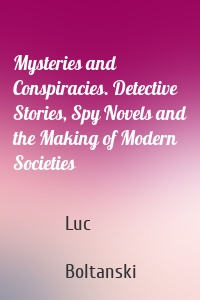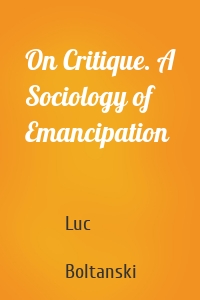Luc Boltanski
3 кн.
Mysteries and Conspiracies. Detecti...
The detective story, focused on inquiries, and in its wake the spy novel, built around conspiracies, developed as genres in the late nineteenth and early twentieth centuries. During the same period, psychiatry was inventing paranoia, sociology was devising new forms of causality to explain the social lives of individuals and groups and political science was shifting the problematics of paranoia from the psychic to the social realm and seeking to explain historical events in terms of conspiracy...
| Автор | Luc Boltanski |
On Critique. A Sociology of Emancip...
The relationship between sociology and social critique has haunted the discipline since its origins. Does critique divert sociology from its scientific project? Or is critique the ultimate goal of sociology, without which the latter would be a futile activity disconnected from the concerns of ordinary people? This issue has underpinned two divergent theoretical orientations that can be found in the discipline today: the critical sociology that was developed in its most elaborate form by Pierre...
| Автор | Luc Boltanski |
Enrichment
This book offers a major new account of modern capitalism and of the ways in which value and wealth are created today. Boltanski and Esquerre argue that capitalism in the West has recently undergone a fundamental transformation characterized by de-industrialization, on the one hand, and, on the other, by the increased exploitation of certain resources that, while not entirely new, have taken on unprecedented importance. It is this new form of exploitation that has given rise to what they call...
| Автор | Luc Boltanski |




